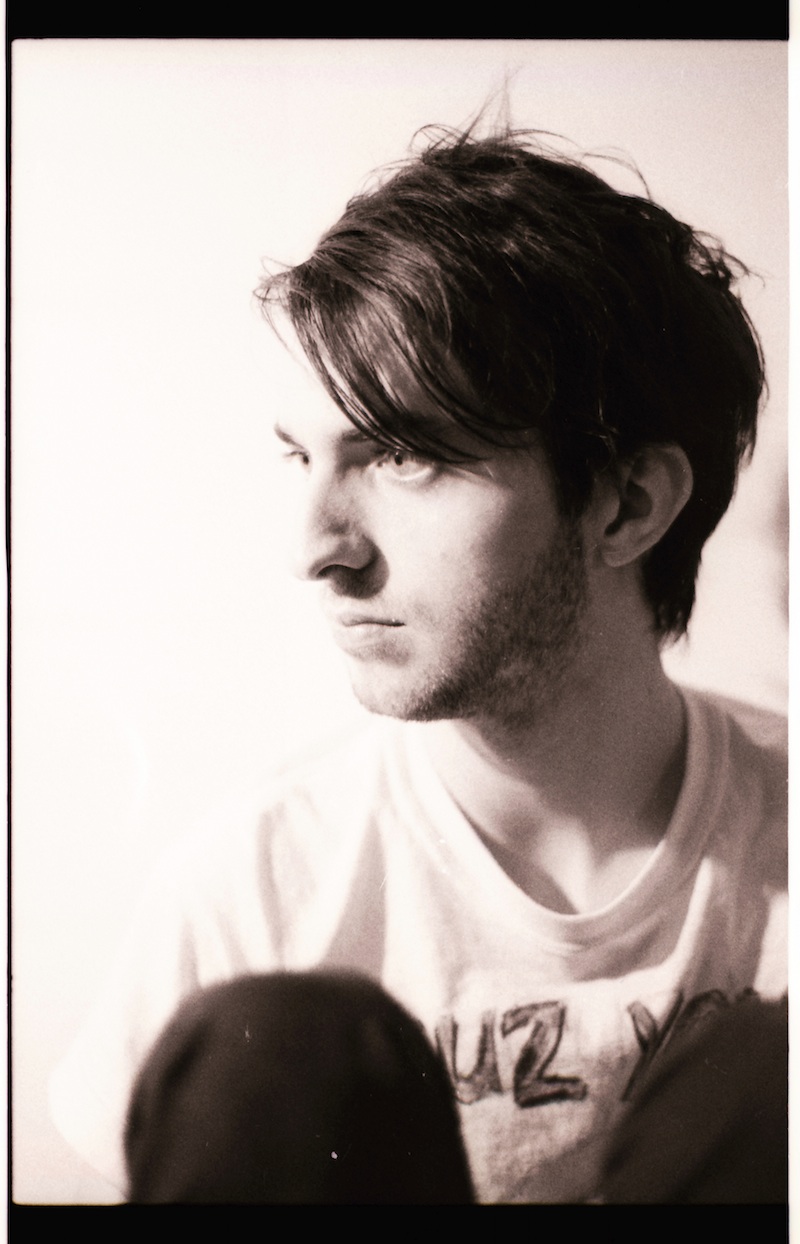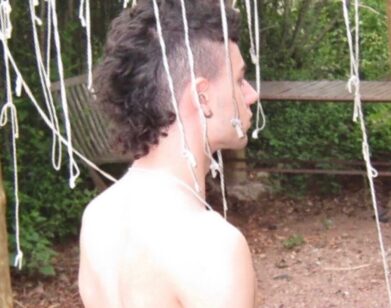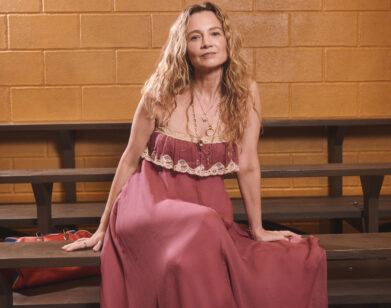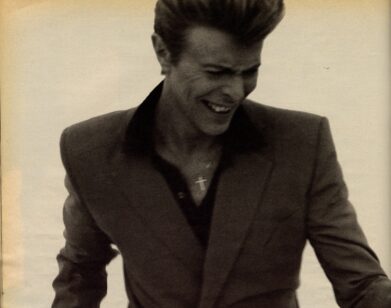Exclusive Song Premiere and Interview: ‘Cop Car,’ Liam Betson

ABOVE: LIAM BETSON
After three albums as Liam the Younger, Liam Betson is finally taking his own name. The Cover of Hunter, his first collection of songs written since he dropped the pseudonym, grasps at wider dynamics and higher fidelities than the tape-hissy first steps heard on the Younger records. It’s a raw record whose darkness unfurls the more you listen, full of lyrics whose offhand delivery hides their heaviness at first.
Formerly a guitarist for Titus Andronicus, Betson brought on a number of collaborators, including Patrick Stickles and Julian Lynch, to add finishing touches to The Cover of Hunter, which is due for release via Double Double Whammy on July 22. We Skyped with the New Jersey-based songwriter about the long process that went into writing the record and the challenges he faced while recording with friends in a studio setting for the first time. We’re also pleased to premiere the eight-minute slow-burner “Cop Car,” the record’s melancholy centerpiece and a beautiful example of Betson’s new long-form songwriting.

SASHA GEFFEN: You’re no longer Liam the Younger; you’re just Liam now. Why did you start using your birth name for this album?
LIAM BETSON: I wanted to make a break from what the Liam the Younger project was, because I had written all those songs when I was a teenager. I took a while writing these new songs and wanted to mark the transition, so I just used my government name. The last album I did as Liam the Younger, I finished writing in 2008 or the beginning of 2009. Then I spent three years writing for this new album, which I then started recording in July 2012. So it was three years, give or take, of writing. The bulk of time was spent on writing lyrics, I would say.
GEFFEN: Do you feel that the lyrics on the new album are more refined than your older work?
BETSON: Yeah, I think that’s fair to say, though I wasn’t throwing away lyrics for the other albums. I was still trying hard. But I had a different approach. I think when people start writing songs, typically you just try to rhyme words and get a message across. I tried to step away from that a bit more on this new record and just say what I wanted to say without relying on poetic devices as much. There’s still some rhymes, but I wanted to be more explicit.
GEFFEN: You’ve brought in a few more instruments. I hear horns on certain tracks, which you didn’t have on older recordings. What made you decide to bring in collaborators?
BETSON: I wanted to make music with other people because the project before had been just me on my own, except for one album with a drummer. This is the first album I recorded at a studio. I wasn’t just doing everything myself in my parents’ basement, so I thought if I was going to be collaborating with an actual record producer, I would like to make more of a communal atmosphere in making the record. I got some people to come up with me to play the basic instruments, the guitars, drums, and bass. But I wanted to add some flairs into the production, so there’s horns and some piano.
GEFFEN: Even though the album sounds like a studio production, the songs themselves feel very internal, very personal. How did you sustain that feeling through the collaboration process?
BETSON: The record was made over the course of half a year, but just weekends at a time. We first went into the studio in July for three days and then we went back in October for a few days. It took a long time to make it, but once I was in the studio, I was always in a rush, which meant that there wasn’t a lot of time to tinker around with the songs. I made the album that I wanted to make, which was organic. The vocals sound like I’m just singing in a room and my voice is echoing. And that is the case. That is actually what was happening.
GEFFEN: What did you learn about your songs by working with people who added new layers to them?
BETSON: I don’t know if I learned anything about my songs, but it was fun and exciting to see them take shape with different people’s personalities on them. I don’t think about my songs ever, so to ask how their playing changed my thinking is a good question, but I’m not really sure. I wish I knew.
GEFFEN: Is each song just something you feel in the moment?
BETSON: It’s a series of moments. You hear about these famous songs that somebody sat down and wrote in five minutes, but I spent a lot of time working on the lyrics. The words come from an emotional place in a certain sense, but it’s also very analytical and cerebral. I would write a draft of lyrics and then work on it for a few days and then walk away from it for two months and then come back to it and change some other things around until eventually I found that things were right. When I say I don’t really think about my songs, I mean that I finished recording the album in February 2013, so it’s been over a year. I don’t think about it too often in specifics.
GEFFEN: What occurs to you in those gaps when you walk away from your lyrics? Why do you feel compelled to come back to a song?
BETSON: For me, the temptation to not write music and to not create anything is sometimes strong. Sometimes I feel like, why add to all the noise that’s out there? The times when I see the point in doing it is when I get excited by a lyrical phrase or even just a couple words that I come up with, something that I think is funny or interesting. It’s just little instances added up over time that get me excited about writing songs and make me feel like I’m at least contributing something somewhat unique to the landscape. There’s just so much out there, so many people asserting their point of view. Sometimes I feel like it’s a bit jockish of me to try to assert my point of view as well. But sometimes it feels worth it. With this last album, once I got into the swing of things and had an idea of what I wanted to do, the temptation to not do it became weaker and weaker and eventually I was convinced that I had to do it for my own self-esteem and happiness.
GEFFEN: How does the final product compare to what you had your sights on at the beginning of this process?
BETSON: I think it came out quite close to what I wanted. I’m really happy with it. It was incredibly stressful. When it comes to making music, I have a nervous personality. Writing is a lot of fun, but recording can get really stressful, especially when you’re pressed for time like I was. In hindsight, I can say it was a good experience and it turned out as good as I could have hoped for, which is nice. That’s probably the first time that’s ever happened to me.
GEFFEN: Did you have any moments during the recording process that were really stressful at the time but turned out to be productive?
BETSON: One of the weekends we were up there, there was a big thunderstorm as we were recording. This was during the basic tracking, so we were doing drums, bass, and guitar. It was the last day that we had booked for the next four months, and it was imperative that we get all the basic tracks done. Early on in the last day of tracking, there was a blackout in the studio for four or five hours. We were without power in this huge thunderstorm. So we were just sitting there. That was stressful. But I read this book People Who Eat Darkness, which is a true crime book that came out a few years ago. It’s a very good book, but it’s a very, very sad and tragic story, as these true crime books I guess always are. I just remember sitting there in the studio, which was in a big barn, this wide-open space, with a huge thunderstorm happening outside, reading this book about a woman being killed in Japan. It was a weird state of mind to be in while worrying about whether we would be able to finish tracking that day because there was no power and if it didn’t come back on, it would have been really stressful trying to reschedule because the producer was really, really busy and I was going on tour. There wasn’t going to be another time that we could really do it.
GEFFEN: It must have felt great when the power came back on.
BETSON: It was amazing. We just went into the room and recorded the last couple songs painlessly. It was a huge weight off my shoulders.
THE COVER OF HUNTER IS OUT JULY 22. FOR MORE ON LIAM BETSON, PLEASE VISIT THE ARTIST’S BANDCAMP.






